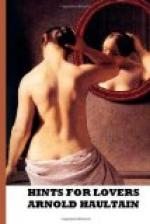What is suitable at one stage of courtship is ruinous at another. And
It is only the old whip who knows when to push the pace:
In courtship to force the running is hazardous. Though we win, the victory loses its sweets. And
In courtship, men too often ride on the snaffle; in matrimony, too often on the curb.
* * *
Courtship asks for cash payment. Matrimony has often to allow unlimited credit. Insolvency is not unknown.
* * *
In courtship, all auxiliaries but the rival. No one will impede a lover save another lover.
* * *
In the presence of a woman, man is by nature a diffident animal. The women who recognize this are often the most successful. Indeed,
Many are the refined and gentle women who in after life regret that they did not more openly cope with their less delicately-minded sisters. Nevertheless,
Nothing is more astonishing than a woman’s tact in encouraging a man.
* * *
In courtship modulated and musical tones count for much. Who with harsh speech would assail a lady’s ear?
* * *
No woman thinks she can be wooed too often. And
Few women can forgo an opportunity to fascinate.
* * *
In courtship the woman is the whole world to the man; in matrimony the man is the whole world to the woman.
* * *
In courtship the slightest suspicion of condescension is fatal. For
True love is a greater leveler than anarchy.
* * *
In courtship, the wooer to the wooed is, in Juliet’s phrase, the god of her idolatry; in matrimony he is lucky if he is the idol of her deity.
* * *
It is a question which is the sweeter: a spontaneous courtship, or one that has sprung from friendship.
In a spontaneous courtship there is all the charm of novelty;
In a courtship that has grown out of affection there is all the trustfulness of friendship. But
Friendship and courtship are two totally distinct things:
In courtship, men and women meet on the flowery-thorny common of love;
In friendship, men and women invite each other over to their respective plots. So,
A friend will show a friend all over his domain;
A lover can but point out to the lover the flowers (and thorns) which grow in the soil to which they are both strangers. 162
* * *
It is an open question whether in matters pre-matrimonial, the mode of the French is not preferable to that of the Anglo-Saxon; whether, that is,
Prudence and prevision are not more certain harbingers of matrimonial happiness of matrimonial happiness than are impulse and passion.
The French couple, when wedded, are virtually strangers; the Anglo-Saxon have already together enacted some scenes of the matrimonial drama. Yet it is an open question also whether




